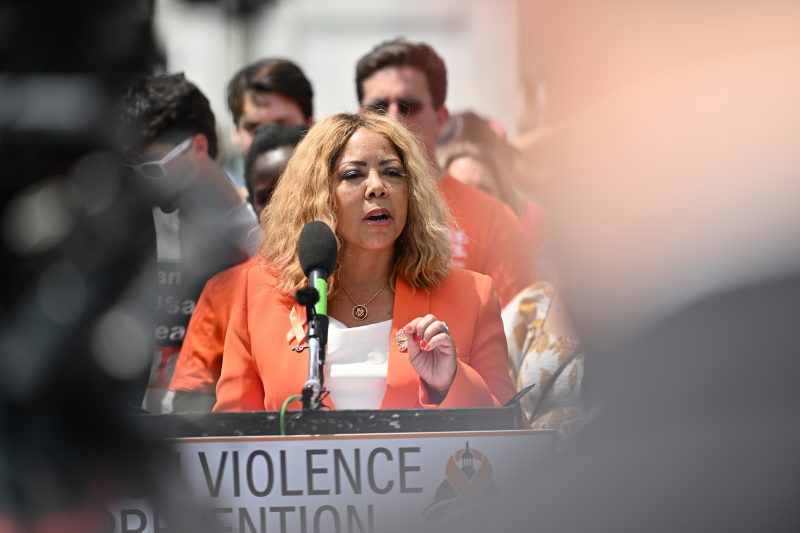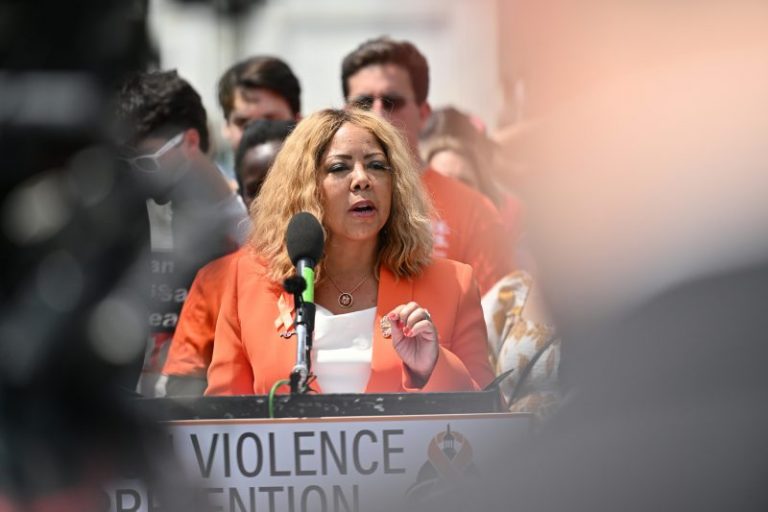
House Democrats are relaunching a longshot effort to transform gun control in the United States by putting pressure on the Republican majority to enact an assault weapons ban that faces opposition even within their own ranks.
A trio of Democrats, who all have become gun reform activists, are set to introduce three separate discharge petitions Tuesday that would supersede objections from Republican leaders to an assault weapons ban and trigger a floor vote if 218 lawmakers, or a majority of the House, signs onto the legislation. If all Democrats sign on to each bill, the minority party would only need the support of five Republicans to force a vote.
Minority Leader Hakeem Jeffries (D-N.Y.) announced the intention of House Democrats to put Republicans, particularly vulnerable lawmakers, on notice for the issue during their caucus meeting Tuesday morning. Three lawmakers formally introduced their petitions on the floor moments after.
Rep. Lucy McBath (D-Ga.) has taken up the mantle from former Rep. David N. Cicilline (D-R.I.) to spearhead passage of an assault weapons ban. Reps. James E. Clyburn (D-S.C.) and Mike Thompson (D-Calif.) are also set to attach their own bills to discharge petitions that would increase background checks for gun purchases. All bills passed a Democratic House majority last term but languished in an evenly split Senate.
“While the American people are calling for progress, it remains clear House Republican leadership refuses to take this issue seriously. The American people deserve more from their elected representatives,” said Thompson, who has introduced a bipartisan background check bill in each Congress for over a decade. “Action on gun violence prevention is long overdue. The only question is will Republicans join us in bringing these bills up for a vote.”
House Democrats’ renewed push coincided with Republican leadership temporarily overcoming its own impasse on a separate issue and passing a bill Tuesday introduced by Georgia Rep. Andrew S. Clyde (R) that would loosen a specific gun regulation on pistol braces, an accessory often paired with AR-style firearms. These modified weapons were used in a Nashville school shooting that killed six, including three children, earlier this year and the 2021 mass shooting in Boulder, Colo., that killed 10 people.
It is also timed with June being Gun Violence Awareness Month, which was established in 2015, and saw two mass shootings occurred one year apart at a South Carolina church in Charleston in 2015 and an Orlando nightclub in 2016. The incidents motivated several lawmakers to introduce their own legislative prescriptions to the problem that has led to more than 260 mass shootings in the United States this year alone, according to the Gun Violence Archives, which defines mass shootings as events that kill or injure more than four people.
Just last week, a bipartisan and bicameral group of lawmakers introduced legislation that would ban the sale of devices that enhance semiautomatic weapons to shoot like automatic firearms, including bump stocks that were used to kill 58 people and injure hundreds attending a 2017 concert in Las Vegas.
Yet the task of shepherding all these bills through a politically divisive Congress has already proven difficult, even after lawmakers was able to break an almost 30-year logjam in Washington by passing the Bipartisan Safer Communities Act in response to back-to-back mass shootings in Uvalde, Tex., and Buffalo last year.
In addition to providing funding for mental health services and school security initiatives, the legislation expanded criminal background checks for some gun buyers, bars a larger group of domestic-violence offenders from purchasing firearms in a provision known as the “boyfriend loophole,” funds programs that would allow authorities to seize guns from troubled individuals and allocated funds for states to better enact the “red flag” laws that McBath had long proposed.
But the legislation failed to include key priorities that Democrats have long championed and faced internal party divisions that prevented it from successfully passing through a Congress that they controlled, including those being put forth via discharge petition.
It is a significant reason a group of Democrats on the Gun Violence Prevention Task Force, which Thompson chairs, began to discuss tying several bills to discharge petitions. Following the Nashville shooting in late March, members within the group began to actively push for a pathway to elevate the lack of inaction by Republicans on gun reforms, even though they acknowledge the difficulty to successfully force action from the minority.
Rep. Abigail Spanberger (D-Va.), who represents battleground Democrats in leadership, repeatedly pushed the idea of discharge petitions to put Republicans on the record, particular vulnerable incumbents, since it would show their lack of support for such proposals. In their first meeting following the Nashville shooting, she played an audio recording of her daughter fearing for her life at school to emphasize just how traumatizing the lack of inaction is to many parents across the country.
Smaller groups of lawmakers on the task force met often in the Capitol suite of Jeffries earlier this year, where they surveyed all the gun reform measures already introduced by the caucus. It was decided in April that the two background check proposals and assault weapons ban would be introduced together to ensure momentum and unity among Democrats, since the latter does not have unanimous support from all Democrats.
Democrats filed the discharge petitions in committees in May with the intentionality of collecting signatures by June. Rep. Maxwell Frost (D-Fla.), who represents the district where the 2016 Pulse nightclub shooting occurred in Orlando, has been credited by fellow Democrats for also helping the task force convince colleagues within the caucus to support the discharge petitions.
Democrats would need five Republicans to sign onto any of the petitions to force a vote on the House floor. Of all three bills, the Bipartisan Background Checks Act, which Thompson first introduced after the 2012 Sandy Hook Elementary shooting, has previously received the most support from across the aisle. The bill, which would require background checks on those looking to transfer or buy a gun, is sponsored by Rep. Brian Fitzpatrick (R-Pa.) and received eight Republican votes in 2021.
The proposal from Clyburn would require background checks to be completed 10 days after someone buys a firearm, increasing the current review period by seven days. It would close the “Charleston loophole,” a reference to how Dylan Roof, a white supremacist, was able to obtain a firearm in 2015 after the three-day review period expired but before the background check was completed. He went on to murder nine Black worshipers in South Carolina at a church in Charleston.
That bill also passed in 2019 with support from two Republicans and opposition from two Democrats. “We don’t have time to waste when it comes to ending the gun violence epidemic. I urge my colleagues across the aisle to join us and sign this discharge petition to honor those we’ve lost and stop these weapons from falling into the wrong hands,” Clyburn said. Saturday is the eighth anniversary of the Charleston shooting.
A Fox News poll in April showed that 87 percent of Americans favor background checks for gun buyers, with about 80 percent of respondents also saying they support enforcing existing gun laws, changing the legal age to purchase a gun to 21 and requiring mental health checks, among other measures. Even so, the two bipartisan background check bills were not taken up in the Senate last term due to insufficient Republican support.
Taking on the herculean pursuit of enacting an assault weapons ban into law is personal for McBath. Her 17-year-old son, Jordan Davis, was killed after being confronted by Michael Dunn for playing loud music in a parked car at a Jacksonville, Fla., gas station in 2012. Dunn, who said he felt threatened, fired several shots into the car, killing Davis. He was convicted of first-degree murder two years later and sentenced to life without parole.
While Democrats were able to pass the assault weapons ban for the first time last year since Cicilline introduced the measure in 2014, roughly a decade after the 1994 ban expired, it did not come without opposition from within their own ranks. Five Democrats voted against it, including three of whom are still serving in office, citing that an assault weapons ban would threaten the Second Amendment.
Only two moderate Republicans, one of whom was reelected, voted for it, including Fitzpatrick, indicating just how difficult it will be for Democrats to get five lawmakers to support a discharge petition and final floor vote. “We want the American public to know and understand that even though we may not get any Republicans to join us, that we’re about the business of saving their lives. Point blank,” McBath said in an interview.
Republicans have yet to consider significant gun reform measures during their first six months in the majority, signaling their own interparty tensions. But that changed as Republican leaders managed to find enough support for a disapproval resolution proposed by Clyde and Rep. Richard Hudson (R-N.C.), that would reverse the Bureau of Alcohol, Tobacco, Firearms and Explosives classifying guns with an attached pistol brace as a rifle subject to regulation under the National Firearms Act.
Republicans argued that the recent decision by ATF is an about face after years of telling pistol brace owners, including under the Obama administration, that they were legally able to own such accessories without restriction. “
“It’s no secret that with this measure, and many other forms of gun control, that the left’s ultimate goal is an unarmed America,” Clyde said during floor debate Tuesday. “Not on my watch.”
The proposal has been a source of contention after far-right lawmakers demanded a vote on it last week as part of a myriad demands to ease their blockade on the House floor. Eleven hard-right Republicans forced leadership to a negotiating table after blocking a key procedural vote, known as a rule, on unrelated bills.
The group was angry with Republican leaders for joining with Democrats to pass the debt ceiling bill that they say does little to address federal spending. Clyde specifically accused Majority Leader Steve Scalise (R-La.) of threatening to not schedule a floor vote for the pistol brace bill if the Georgia lawmaker did not support the debt bill. Scalise denied that and worked last week with Clyde to whip the 218 Republican votes needed to ensure its passage Tuesday.
The measure ultimately passed, 219-210, a narrow victory for Republicans after Fitzpatrick and Rep. Thomas Kean Jr. (R-N.J.) voted against and others, like Rep. Michael Lawler (R-N.Y.), wavered until the final minute before casting their support to help notch a victory for their party.
“I think, basically, there will be a great distinction between what we do with our discharge petitions and what my Republican colleagues are doing with Mr. Clyde,” McBath said about the coincidental timing. “I’m willing to help this process play out, however long it takes.”


Comments are closed.